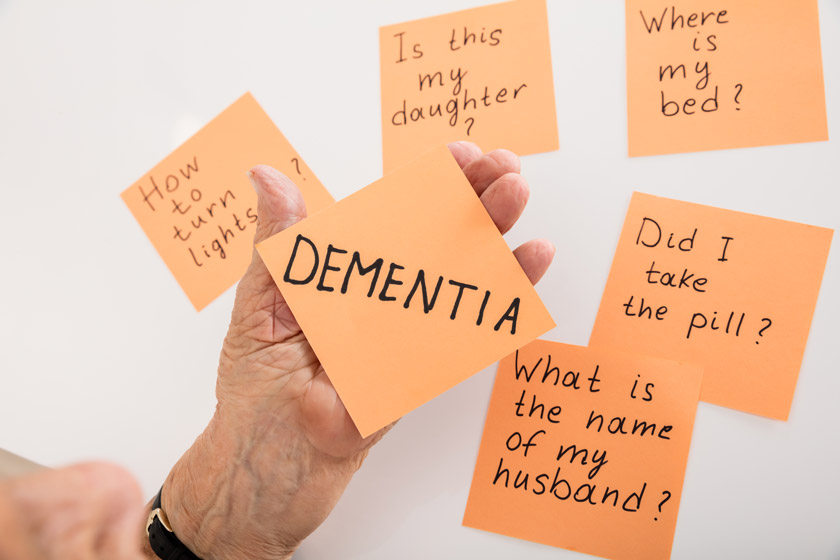
A Guide to Understanding and Communicating with Dementia Patients
Going through dementia can be scary, painful, and sad. But the dementia patient is not the only one that is going to deal with the changes, gradual worsening, and troubles of this disease. Family members, friends, caregivers, and in short, anyone who cares about the patient and loves them will be affected by the situation.
That’s why we need to learn more about dementia. We need to learn how dementia patients behave and how to behave around them. It’s necessary to learn how to communicate with patients and how to treat them so we can make things easier on ourselves and, of course, our loved ones with dementia.
And that is exactly the type of information this article will be trying to cover. So read along, and master the proper dementia behaviour.
Contents
What Is Dementia?
It’s only logical to go over a brief explanation of the disease if we’re going to learn how to handle it. In simple terms, dementia is a general term describing a collection of disorders that impair a person’s capability of thinking, reasoning, remembering, and, to sum up, cognitive functioning.
This means there are going to be negative impacts on the patient’s memory, logic, and even day-to-day functioning. Needless to say, it’s going to be a hard time, a time when our loved one needs our utmost support.
As we said, dementia is not a specific disease but more of a collective state, including a range of diseases, probably the most common of them being Alzheimer’s disease. So contrary to the common belief, these two conditions are not really the same.
Read more here on the Differences Between Dementia and Alzheimer’s that Few Are Aware Of.
Now that we know the basics let’s focus on the changes the patients go through after developing dementia.
What Is It Like to Be a Dementia Patient?
If we’re going to understand how to communicate with dementia patients and behave around them, we need to put ourselves in their shoes.
the Changes Dementia Patients Can Undergo
- Memory loss
- Disorientation
- Inability to live independently
- Loss of confidence and self-esteem
- Changes in personality
- Lack of necessary skills and abilities for everyday life
What Dementia Patients Have Difficulty with:
- Solving problems and reasoning
- Finding the right words to express themselves and communicate
- Managing complex tasks
- Identifying things
- Concentrating and staying away from distractions
- Making reasonable decisions
- Judging directions and distance
- Coordinating body movements
Conditions Dementia Patients May Experience
- Anxiety
- Depression
- Paranoia
- Hallucination
- Show inappropriate behaviour
So you see, it’s not easy to go through one of the most threatening mental disorders in seniors. We need to stay considerate and supportive throughout the process and communicate with the dementia patient as well as we can.
How to Behave Around Patients With Dementia
In the earlier stages of the disease, the patient may realize what’s happening to them and show awareness of the symptoms and changes. The signs don’t appear immediately. Dementia is a gradual process, and as the process goes by, we need to offer support and consideration and provide a comfortable environment for our loved ones who are going through all of this.
The most important thing we need to do, perhaps the hardest thing, is to accept what is happening. Let’s face it; no one likes something as heartbreaking as dementia happens to their family and close friends. But denying the bitter truth won’t do the patient or any of us any good. Instead of disregarding what might be true, we should stay strong and show the patient they’re not alone in any part of the disease.
After acknowledging the fact that our loved one has dementia, we need to learn how to keep communicating with them because it’s important not to leave them alone.
Stay Positive Around Them
While communicating with someone going through dementia can have its challenges, we should never let our attitude, tone of voice, or body language carry negative connotations around them. When the patients are in a positive and pleasant environment, they communicate with us more easily.
Even as patients, it’s easier for us to communicate with cheerful people who make us laugh or let us enjoy a conversation.
Always Remain Respectful to Them
There is this dangerous notion stating that once a person is diagnosed with dementia, they lose their value as a respectful individual. Losing autonomy and independence because of a disease does not in any way mean that we can disregard the patients’ wishes or treat them however we see fit.
Always remember that before anything, patients are human beings deserving individual rights and respect just like anyone else.
Be Clear with What You Say to Them
We learned previously that dementia patients might have difficulties using the language. They might not be able to find the right words to express their inner thoughts, and they might also have trouble comprehending complex messages.
The key to communicating with someone who has dementia is to stay simple and straightforward. Avoid complex structures of grammar, vocabulary, and linguistic devices. State your message as clearly as you can at a slow pace. Moreover, stick to simple questions, preferably those that are possible to answer with a simple “yes” or “no.”
If they have trouble understanding you, first repeat yourself with a neutral and reassuring tone. For the third try, rephrase your message and use simpler wording. Never raise your voice when the patient has difficulty grasping the meaning of your words.
Help Them Focus
Sometimes, dementia patients may find it hard to engage in a conversation with you because it’s hard for them to concentrate. What you can do is eliminate sources of distractions to improve their focus.
Turn off the TV, Close the doors and windows if there’s too much noise coming from the streets, call their name, and make sure they are paying attention to what you have to say.
Give Them Your Full Attention
Just like how we want them to pay attention to us, they need us to hear out what they say and be attentive.
Another disturbing notion regarding dementia is that “patients are not aware of what they are saying, so whatever they say has no importance.” Never accept this harmful behaviour. Listen to the patients and be present with every bit of your mind when they want to communicate with you.
Distract Them From Negative Situations and Emotions
If your loved one shows signs of discomfort or disquiet, direct their attention to another issue or take them to another place that doesn’t upset them.
Take them outside when they are not happy at home, pay attention to any drop in their mood, and show your affection by caring about how they feel.
Don’t Pressure Them Into Remembering Things
Witnessing the memory loss of someone so close to you with whom you have shared many memories is heartbreaking and hard; there’s no denying that.
But constantly asking a dementia patient to remember something or if they recognize you is never appropriate.
Never say, “Do you remember…?” instead, say, “I remember…” and remind them of your happy times in a gentle, subtle way.
Be Careful With What You Say to Them
We should stay considerate at all costs, but we never have the right to patronize the patients. Paying attention to what we say to them, or even to someone else in their presence, is of great importance. For example, saying things like “they are suffering from dementia” or “their condition is getting worse” in front of them is never acceptable.
Final Words
The road a disease like dementia sets ahead of patients is difficult and frustrating. What can make such an experience easier is to let them know we are accompanying them in every step. If we learn how to act around dementia patients in our family, this challenging process will be our chance to show them how much we love and care about them.
Is anyone from your family and friends diagnosed with dementia? Do you have anything you wish to add to this guide? Let us know in the comments!
Read more:
- Fun Questions to Ask Dementia Patients
- A Brief Review of Genetic Aspects of Alzheimer’s Disease
- Must-Need Information About Alzheimer’s in Seniors




This is a tricky subject, ain’t it? Being diagnosed with dementia myself, I have a lot to say on this…. It all depends on what stage of dementia we are talking about! We may KNOW we’re suffering from dementia, but many of us are in denial.
I’ve driven for over 30 years, and I don’t want to stop, but I have to…. I’m still independent and don’t like others telling me what to do. My advice is to behave with people with dementia the same as you would with any adult suffering from any disease. Honest and respectful.
Well, I believe that you behave right with a person dealing with dementia by being honest with them. Tell them what their disease actually is and what must change in their life. Consistent respect and kindness are the keys to decreasing escalating behaviours.
Just Be nice. Remember that they are struggling. A valuable tip: just be careful in your approach. Always approach from the front where they can see you coming. It is important to make them feel as safe as possible. I learned this while taking care of my dad in late stage five.…
I can only suggest what I have been through myself, the most essential thing is to keep your beloved calm, and that’s what I did why my dad. In stage 5, dementia patients lose their peripheral vision and can’t see you standing beside them. So If you touch them, they will startle.
You need to get out of their vision when they get angry, where you can still keep an eye on them. Just give them 5 minutes. Usually, they will forget the whole thing, so reapproaching them under their eye level with a smile will often be safe.
There is a great deal to say about this topic. I spent half my life with an elderly father diagnosed with dementia. It’s important to acknowledge what a dementia patient has said, even if it doesn’t answer your question. – Let them know you have heard them and encourage them to elaborate on their answer – and perhaps the most important thing is not to give them complicated options or choices.
My father has always been independent. He is diagnosed with Dementia now. How can I get him to start accepting some help in the house? He yells and panics when I tell him he needs a caregiver.
The situation is truly challenging. Every one of you who is living with a Dementia patient knows what I mean. Sometimes it’s hard to keep your cool. However, you must adjust your expectations. Those days of fast back-and-forth banter that used to come so quickly between you will require more focus and concentration. Your parent may appear more forgetful and confused at times. You can, however, make the most of the good moments by changing how you approach each interaction.
As someone who has a loved one with dementia, I found this article to be incredibly valuable in helping me understand how to communicate more effectively with them.
A quick reminder: not all forms of dementia are the same, and specific strategies that work for one person may not work for another. It’s essential for caregivers and family members to be patient and flexible and to continue to educate themselves on the latest research and best practices for dementia care.